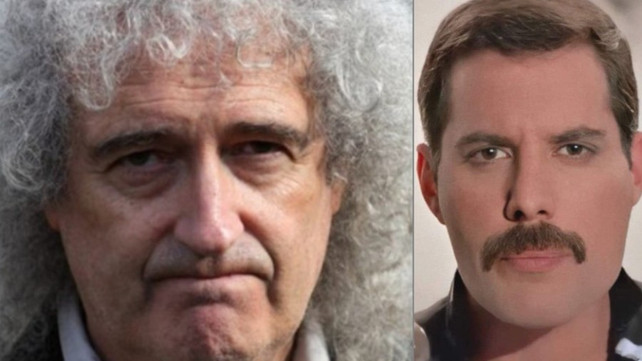When we first worked with him, it was a little unnerving, because he did a lot of running around the place and screaming his head off. So we thought, ‘Is this going work?'”
Brian May looked back on what Freddie Mercury was like when they first met as young college students, noting how the late icon was already a star “in his mind” back then.
00:06
46:07
Tony Levin on BEAT, David Gilmour & John Lennon | On The…
Andy Summers on riffs, Robert Fripp and music post-Police |…
Zakk Wylde on Pantera & his Ozzy audition | On The…
Mick Mars on perseverance & post-Mötley Crüe music |…
John 5 on David Lee Roth, Prince and his beloved Telecaster |…
In Conversation with Fluff (Riffs, Beards & Gear) | NAMM 2024
Introducing Practice Mode: Your Smart Guitar Coach
Marty Friedman on why guitar is lucky to still be around | On…
Steve Vai on Korn, Satriani & 7-string guitars | On The…
Xadi’s Story | It All Starts with Ultimate Guitar
one of the most significant bands in the history of rock, with every single one of them rising to high acclaim in their respective fields.
Naturally, Queen, like its members, took time to evolve into what it is remembered as today. However, Sir Brian May recalled during a recent Q&A session that his late friend and iconic Queen frontman Freddie Mercury had always unapologetically been — well, Freddie Mercury. Looking back on how the seeds of Queen were sown, the guitarist began (transcribed by Ultimate Guitar):
“When we first met, we were all at colleges, different colleges. [Freddie]’s at art school. I’m at Imperial College, Roger’s at a dental school, Deacy is doing electronics. We get to know each other socially. And Freddie is, in his mind, already a star. He’s very flamboyant; he dresses like a rock star… He’s a born performer, I suppose, ’cause he has that belief in him.”
Even so, Sir May admits that Freddie’s character made up for some “unnerving” early experiences for the rest of the band, which made them doubt whether the whole thing would work:
“When we first worked with him, it was a little unnerving, because he did a lot of running around the place and screaming his head off. So we thought, ‘Is this going work?'”
As for how others outside of the band perceived the young Mercury, Brian May offered:
“And not everybody liked him, to say. A lot of people found him kind of abrasive, but they all thought he was interesting and entertaining. At that point, though, he wasn’t the singer that we all got to know as Freddie Mercury. What happened was, we went into the studio, and it happened during those first demo sessions we did in De Lane Lea [Studios]… As soon as Freddie heard his voice coming back, he went, ‘Oh, I don’t like it. I’m gonna do that again.’ And he would go back, and back, and back until he got it the way he wanted it. So, he became instantly, very aware of what he sounded like, and incredibly quickly fashioned himself into the singer he wanted to be.”
“Now I’m simplifying because it went on quite a long time. It probably went on forever. Every time we’re going to make a new album, Freddie would push himself further. He would hear himself come back, and he would say, ‘No, I want to do better, longer, more passion, more…’ whatever it was. He was always looking for new textures, and looking to get more out of himself.”
He added:
“Yes, we did help [with that process] because every time one of us is in the studio, the rest of us are in the control room. So a lot of the time, I’m sitting with the engineer [while] Freddie’s doing a vocal. And he goes, ‘Well, how’s that?’ And I go, ‘Well, we kind of like that bit, but we didn’t like how it kind of went that way…’ So we’re helping to build what works, and the same [was] the other way around. If I’m doing a guitar solo, Freddie was there. We’re pushing each other the whole time, and it’s really valuable.”
